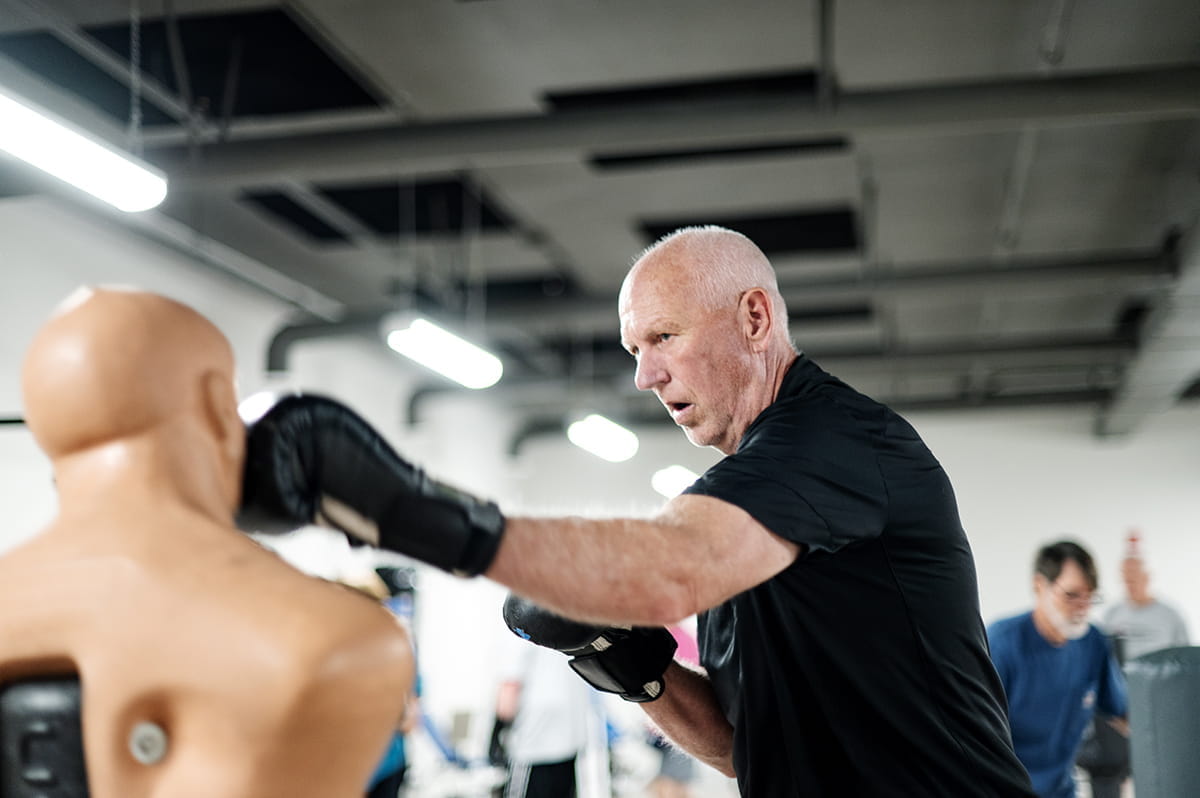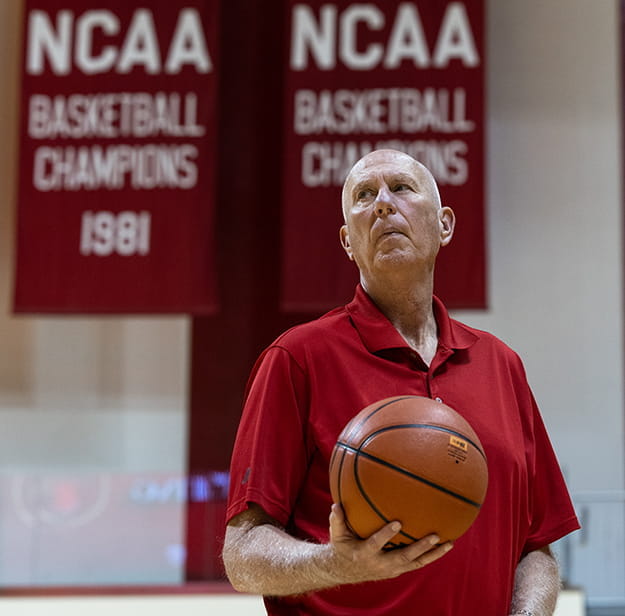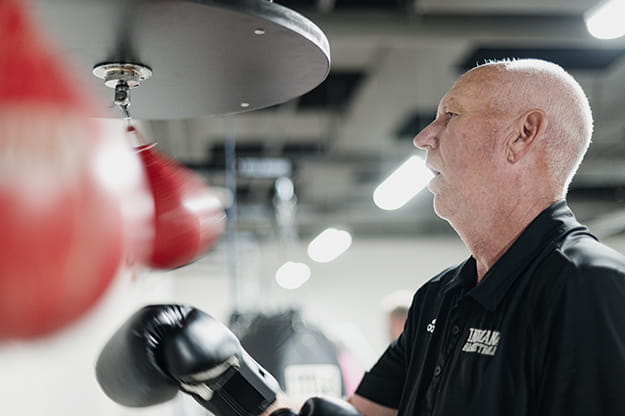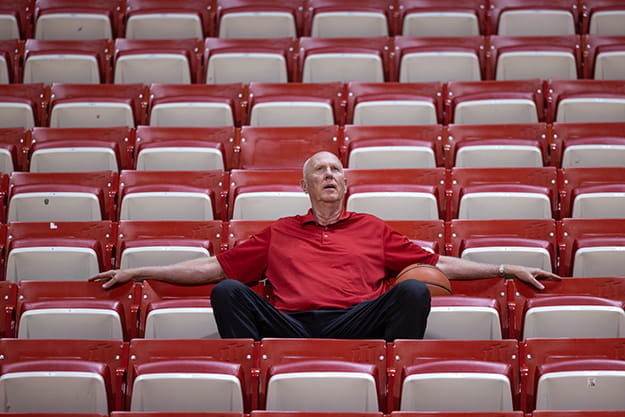Fighting Back

Bobby King Dec 13, 2023
TED KITCHEL, the former Indiana University basketball star who won a championship under the late, legendary coach Bobby Knight, straps on some boxing gloves and takes position across from a silent, straight-jawed figure who, by coincidence, is also named Bob.
Bob has flesh made of rubber, a skeleton of metal, and a face that is imminently punchable. He is, after all, a boxing dummy built to take a beating. And Ted, now 64, is about to give him one.
Ten blows to Bob’s face. Ten to the chest. Ten to the gut. And the dummy looks dazed. With Bob dispatched, Ted moves over to a 50-pound bag of dead weight hanging from a chain like a side of beef. He unleashes a torrent of blows, first with his left hand, then the right, then in combinations. Between 2½-minute bursts, Ted takes 30-second breaks. The bag seems to appreciate it.
The workout continues. There’s more punching, some kickboxing, some toe-tapping exercises and several minutes of jumping rope, which Ted describes as a “killer,” although he looks like he could go for more. Finally, Ted grabs a baseball bat off a rack and begins beating the tar out of a truck tire. It’s a violent display. By the time he’s done, the tire is properly tenderized and the smooth dome of Ted’s head is covered in large beads of sweat. “I’m pretty worn out,” he says flatly.
Even in this gym, the competitor in Ted Kitchel comes out. A guy in his class once made a display of unloading 66 punches on one of the boxing apparatuses—an impressive showing.
Ted stepped up and hit the machine 100 times. The classmate returned and hit it 101. Tired of trifling, Ted unleashed a furry of 210 blows, and it was game over. “Most people who know me know that I’m a little competitive,” Ted said. “I couldn’t let somebody beat me.”
That seems to include his real opponent these days, the toughest adversary Ted has ever faced, the foe trying to rob him of his balance and make his right hand—his shooting hand—shake in ways it never did even in the closest games. The adversary he’s trying to defeat—with exercise and fundraisers to support research at IU School of Medicine—is Parkinson’s disease.

TED KITCHEL IS, in some ways, the quintessential Hoosier. He grew up on a farm in a small town—Galveston, Indiana—where his family grew corn and soybeans. He worked on his jump shot on a hoop in the barn. He led tiny Lewis Cass High School to its first sectional championship back in the days when big schools and small ones competed for the same title—the way he prefers it. At IU, he took his share of abuse from Knight—“He was always on my ass,” Ted says. “He knew I could handle it.” He met his future wife Kristi—a diver turned cheerleader—at IU. He helped lead the Hoosiers to three Big Ten titles and was a key cog on the team that won IU a national championship in 1981.
Yet Ted’s Hoosier story took an unexpected turn. In 2015, he developed a tremor in his right hand. At first, he thought it was a side effect of the medications he was taking for blood clots. But the tremors persisted and one of his colleagues at FootJoy, the sports gear company where Ted worked in sales, urged him to see a neurologist in Boston. He went and, in less than 20 minutes, Ted received both a diagnosis and a second opinion: It’s Parkinson’s. That’s how clear the symptoms were.
At the time, all Ted knew of Parkinson’s was its impact on Michael J. Fox, the actor whose tremors were by then visible for the world to see. Fox’s case was much more advanced, the doctor said. And Ted found some reassurance learning that, while not curable, Parkinson’s is a disease patients can live reasonably well with for a long time. Still, Ted said, in a low-key assessment of this pivotal moment in his life: “It kind of scares you.”
Once back in Indiana, after Ted delivered the news to Kristi and their children, he was connected to doctors at IU, which has been named a Center of Excellence by the Parkinson’s Foundation for its high-quality care. Eventually, he came under the care of S. Elizabeth Zauber, MD, the center’s director and an associate professor of clinical neurology at IU School of Medicine.
In most people, Zauber said, the causes of Parkinson’s disease are not clear. Exposure to certain pesticides and other toxins is believed to be one culprit. For many patients, the suspect seems rooted in genetic factors.
IU School of Medicine is conducting Parkinson’s disease research in several areas.
Zauber’s research includes clinical trials of new medicines aimed at treating the symptoms of the disease as well as drugs to slow its course, along with studies of the impact of Deep Brain Stimulation and focused ultrasound as treatment for motor symptoms.
Tatiana Foroud, PhD, a professor in the Department of Medical and Molecular Genetics and the school’s executive associate dean for research affairs has support from the Michael J. Fox Foundation and the NIH to maintain a biorepository of blood, tissue and other samples. They were collected as part of ongoing research studies seeking to chart the biological and clinical changes across the spectrum of the disease—and to identify early signals of the disease and points where treatments should be directed.
Foroud and Zauber are both part of an ongoing research study funded by the Parkinson Foundation that provides free genetic testing and counseling for people with Parkinson’s disease—a service that tells them if they have inherited genetic variants associated with Parkinson’s disease.
While there are medications that alleviate the symptoms, there are no treatments proven to slow the course of the disease over time—except maybe one. Exercise hasn’t yet been proven to slow Parkinson’s, but there are some indications that it may do so. Zauber says there even seems to be a dose-dependent effect in reducing the symptoms—the more intense the exercise regimen, the greater the benefit.

THIS IS THE idea that draws Ted twice weekly to the Social of Greenwood, a center for seniors near his home. It’s where he faces off against Bob—and against Parkinson’s.
As soon as they learned of their dad’s diagnosis, Ted’s kids—Tyler, Scott and Mackenzie—began scouring the web for information about the disease. They quickly noticed the part about the need to exercise. They also discovered Rock Steady Boxing.
Developed in Indianapolis by a patient with Parkinson’s who received some training in boxing, Rock Steady Boxing groups have since spread across the United States and around the world. It employs an assortment of exercises—many boxing-oriented—that include cardiovascular work, balance exercises, stretching and strengthening.
Zauber is an enthusiastic believer in Rock Steady Boxing. She sits on the non-profit’s board. And she’s about to begin a research study that aims to find out precisely which aspects of exercises in the Rock Steady regimen are most effective for Parkinson’s.
Wherever that leads, it’s clear Rock Steady gives people like Ted a chance to literally fight back against this chronic illness. “When you are hitting the punching bag,” Zauber said, “you are, in a way, hitting this disease and taking control of your health in a way that can be very empowering for people.”
Ted Kitchel has plenty of stories to tell about his playing days—and of Knight. When he was sidelined with a pulled a groin muscle, Knight grew angry when Ted told him he’d be out of action for three or four days. “When I was (playing) at Ohio State,” Ted recalls Knight yelling, “(John) Havlicek played with two pulled hamstrings.” To which Ted quipped to teammate Phil Isenbarger that the great Havlicek, even on two bad legs, was still much preferable to Ohio State’s sixth man back then—Bobby Knight.
The story was supposed to just be a laugh shared between teammates. But when IU won the championship and their celebration banquet was broadcast on local TV, Isenbarger took the microphone and shared Ted’s quip in front of Knight and the world. Knight, Ted learned later, turned to someone and said: “Kitchel couldn’t have thought of that. He ain’t that f——— smart.”
For all Knight’s fire, Ted appreciated him as a great coach. But for instilling him with grit—and the resiliency he uses now to confront Parkinson’s—Ted credits his own mother. “My mother is very, very tough, hard-nosed,” he said. “That is the way she expected us to be.”

THESE DAYS, sleeping doesn’t easily come for Ted. He occasionally experiences episodes of vertigo and battles fatigue. And then there’s the only visible sign of Parkinson’s in Ted Kitchel—the tremors in his right hand. They appear when he’s sitting and talking or when he lines up a shot on the golf course, the head of the club wobbling just a bit.
At the same time, Ted’s workout routine could leave someone decades younger gasping for air. And he remains within 10 or 15 pounds of his college playing weight. Even with the tremors in his hand, he remains a good golfer, but one who grumbles that Parkinson’s has added a couple of strokes to his scorecard.
His teammates, these days, are the members of his Rock Steady Boxing class, who, like him, have Parkinson’s. Together, they break their huddle before workouts with the count, “One, two, three, fight back.” At gatherings for the Rock Steady families, Kristi says the spouses of the other classmates tell her how much it means to have Ted in class. “I think at first Ted didn’t realize it, but he encourages so many of them, and gets them to do more than they think they can.” But Ted maintains a matter-of-fact way of looking at things.
“People need to understand that just because they have Parkinson’s, it’s not a death blow,” he said. “You’ve got to keep focusing every day, whether it is Rock Steady Boxing, whether it be lifting weights or working out, riding a bicycle. Stay active. Don’t sit on the couch and feel sorry for yourself.” Aside from boxing, Ted is also fighting back against Parkinson’s by raising that kind of awareness—in public speaking and in media appearances.
His biggest push—with intense support from his family and close friends—has been an annual golf outing at Valle Vista Golf Club in Greenwood that raises money for Parkinson’s research at IU School of Medicine. The latest golf outing, in August, drew 135 golfers and raised approximately $75,000. Over four years, the event has raised more than $230,000 for research.
He kicked off the event by welcoming the golfers and then camped out on the 11th hole, playing the Par 3 with each of the groups passing through. Most of the time, his ball was the best one off the tee.
Ted and his family are hopeful the research at IU School of Medicine and other sites advances quickly enough to help him, but they also want it to benefit others. And maybe because of his mother’s toughness, because of the thick skin he developed under Knight, and because of his Christian faith, Ted feels well-equipped to face his most formidable foe.
“The easiest thing to do is to say ‘Why me? Why do I have the shaking?’ The reason may be that I can handle it better than most people,” Kitchel said. “The good Lord has put it on my shoulders to take care of it and I’ll do the best I can.”
To support research aimed at understanding the biology of Parkinson’s disease and easing its symptoms, contact Sam Kinder at 317-278-5635 or kindersm@iu.edu.
Bobby King
Bobby King is the director of development and alumni communications in the Office of Gift Development. Before joining the IU School of Medicine in 2018, Bobby was a reporter with The Indianapolis Star. Before that he was a reporter for newspapers in Kentucky, South Carolina and Florida.